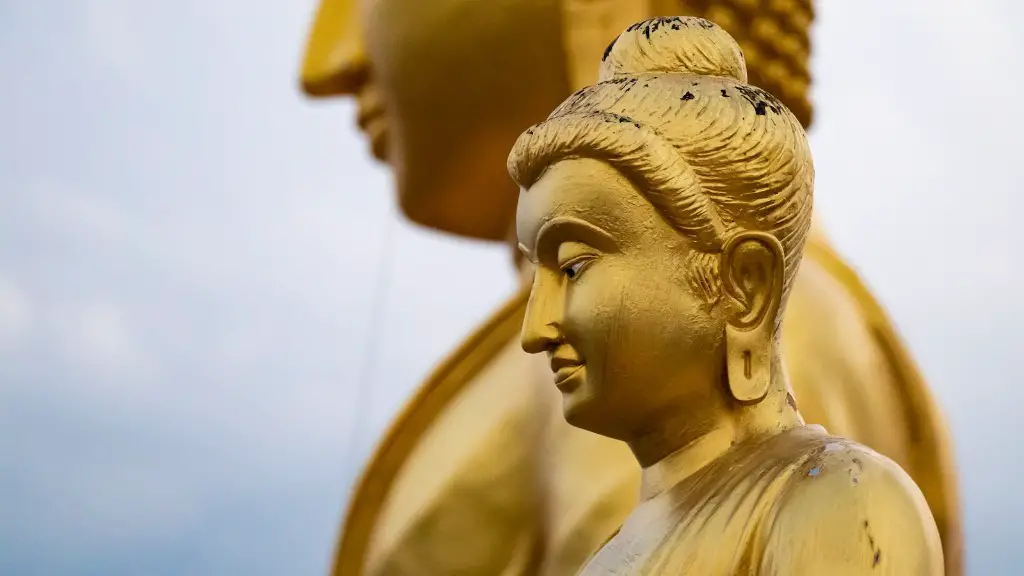Buddhism is a religion that began in India about 2,500 years ago. There is no one founder of Buddhism. The Buddha, which means “awakened one” in Sanskrit, was a man named Siddhartha Gautama who lived in the 6th century BC. Siddhartha Gautama was born into a rich family and had everything he could ever want, but he was not happy. He realized that material things could not bring lasting happiness, so he left his home and family to search for a way to end suffering. After many years of study and meditation, Siddhartha Gautama became the Buddha and achieved nirvana. Nirvana is a state of perfect peace and enlightenment.
The main teaching of Buddhism is that all beings have the same Buddha nature and have the potential to achieve nirvana. The way to achieve nirvana is through ethical conduct, meditation, and wisdom. Buddhists believe that life is a cycle of birth, death, and rebirth. Suffering is caused by attachment to things that are impermanent. The only way to end suffering is to end attachment.
According to Buddhism, the way to Nirvana (a state of perfect peace and bliss) lies in understanding and rejecting the false beliefs that keep us trapped in the cycle of suffering. The main teachings of Buddhism are known as the Four Noble Truths:
1. Life is suffering (dukkha).
2. The cause of suffering is desire and attachment (trishna).
3. Suffering can be ended by letting go of desires (nirvana).
4. The path to nirvana is the Eightfold Path.
The Four Noble Truths are at the heart of the Buddhist teachings and offer a profound insight into the nature of human existence.
What are the 3 main beliefs of Buddhism?
Buddhism is a religion based on the teachings of Siddhartha Gautama. Its main principles are karma, rebirth, and impermanence.
The Five Precepts are a set of guidelines for living a moral and ethical life. They are based on the teachings of the Buddha and are designed to help us live a life that is in harmony with others and with the world around us. The precepts are:
1. Refrain from taking life
2. Refrain from taking what is not given
3. Refrain from the misuse of the senses
4. Refrain from wrong speech
5. Refrain from intoxicants that cloud the mind.
The first precept, to refrain from taking life, is based on the belief that all life is sacred and that we should not take the life of another living being. The second precept, to refrain from taking what is not given, is based on the belief that we should not take what belongs to others. The third precept, to refrain from the misuse of the senses, is based on the belief that we should not indulge in too much sensual pleasure. The fourth precept, to refrain from wrong speech, is based on the belief that we should not speak words that can hurt or harm others. The fifth precept, to refrain from intoxicants that cloud the mind, is based on the belief that we should not take substances
What are the main values and beliefs of Buddhism
The main Buddhist values are love, wisdom, goodness, calmness and self-control. Buddhists believe that people should try to end suffering; all things should be seen as having no self or essential nature.
Buddhism teaches that after a person dies, their soul is reborn into another person or animal. This cycle of birth, death and rebirth is called reincarnation. Buddhists believe that reincarnation is a way for the soul to learn and grow, and that each life is an opportunity to do good deeds and become closer to Nirvana, or enlightenment.
What are the 7 rules of Buddhism?
Buddha’s 7 Rules of Happiness are:
1. Clear Viewpoint: Don’t just believe anything just because you saw it or you heard it.
2. Values: We end up digging a hole so deep that it is hard for us to find a way back home.
3. Words that Inspire: Actions in Positive Direction.
4. Efforts with Impact: Be Mindful.
5. Concentrate Right: Let Go.
6. Be in the Present Moment: Do not Dwell in the Past.
7. Let Go of Attachments: This is the Path to True Happiness.
The Four Noble Truths are the foundation of Buddha’s teachings. They provide a clear and concise explanation of the human condition and the path to liberation from suffering. Though they leave much left unexplained, the Four Noble Truths provide a powerful framework for understanding the Buddha’s teachings.
What are the 3 main beliefs of Buddhism quizlet?
Buddhism beliefs Karma, reincarnation, enlightenment, rejected caste system, Nirvana, four noble truths, eight fold path
Karma is the belief that good deeds will lead to a better future, while bad deeds will lead to a worse future. This belief is a fundamental tenet of Buddhism, and it is what drives many Buddhists to do good deeds in the present.
Reincarnation is the belief that after someone dies, they are reborn into another form. This could be another human, an animal, or even a plant. This belief is based on the idea of Karma, and it is believed that how someone lives their life will determine what they are reborn as.
Enlightenment is the belief that by achieving Nirvana, one can escape the cycle of Samsara and attain a state of perfect peace and bliss. Nirvana is the Highest State that a person can achieve, and it is only attainable through Enlightenment.
The caste system is a form of social stratification that was rejected by the Buddha. He believed that everyone is equal and should be treated as such.
The four noble truths are the foundation of Buddhism. They are:
1. Suffering exists
2. Suffering is caused
While Buddhism does not focus on the worship of a creator god, it is still a religion that is focused on spiritual liberation. The Buddha himself rejected the idea of a creator god, and Buddhist philosophers have even argued that belief in an eternal god is nothing but a distraction for humans seeking enlightenment. However, this does not mean that Buddhism is not a theistic religion. There are many Buddhists who still believe in a creator god, and they see Buddhism as a way to connect with this god.
What is the golden rule in Buddhism
“Hurt not others with what pains yourself” is a quote from the Buddha that illustrates the moral principle known as the Golden Rule. The Golden Rule states that we should treat others as we want to be treated. This means that we should not do anything to others that we would not want done to us. This is a powerful moral principle that can help us to live peaceful and harmonious lives.
Buddhist morality is based on the principle of rebirth. This principle holds that good deeds lead to good rebirths, and bad deeds lead to bad rebirths. The goal of Buddhist morality is to escape the cycle of rebirth and achieve nirvana.
The 10 precepts are a code of morality that Buddhists are expected to follow. They are:
1. Do not take life.
2. Do not take what is not given.
3. Do not commit sexual misconduct.
4. Do not lie.
5. Do not take intoxicants.
6. Do not eat at night.
7. Do not wear garlands or perfume.
8. Do not sleep on a high or luxurious bed.
9. Do not accept gold or silver.
10. Do not engage in wrong livelihood.
Buddhist morality is based on the principle of karma, which holds that a person’s actions have consequences in this life and in future lives. By following the 10 precepts, Buddhists aim to live in a way that will lead to good karma and eventually nirvana.
Do Buddhists believe in heaven?
In Buddhism, there is no concept of punishment or reward and there is no divine being who decides who goes to hell or heaven. There is merely the illusory results of our thought, words and deeds, which we call karma.
Buddhism teaches that life and death are part of a continuum, and that consciousness (the spirit) continues after death and may be reborn. Death can be an opportunity for liberation from the cycle of life, death and rebirth.
Who is Jesus in Buddhism
There are some high level Buddhists that have drawn analogies between Jesus and Buddhism. The Dalai Lama stated in 2001 that “Jesus Christ also lived previous lives”, and added that “So, you see, he reached a high state, either as a Bodhisattva, or an enlightened person, through Buddhist practice or something like that”. Thich Nhat Hanh has also said that “Jesus is my brother” and that he loves Jesus.
Karma is often understood as a kind of cosmic justice system in which one’s good deeds lead to a happy and prosperous life, while bad deeds lead to a life of suffering. The concept of karma is closely associated with the idea of rebirth, or reincarnation, in many schools of Indian religions (particularly Hinduism, Buddhism, Jainism and Sikhism), as well as Taoism. In these traditions, the accumulated effects of one’s karma determine the conditions of one’s next life, and the goal is to achieve liberation from the cycle of rebirth.
What is the symbol of Buddhism?
The Dharma Wheel is one of the most important symbols of Buddhism. It is a symbol of the Buddha’s teachings, and of the path to enlightenment. The wheel is often seen in Buddhist art, and is used as a symbol of the Buddha’s teachings.
Pasting gold leaf onto statues at pagodas is a way to honor the Buddha’s teachings. Gilding such figures is, according practitioners of Buddhism, “an act of loving kindness” and a path to “transfer good merits”. Gold in Buddhism signifies the sun: a flame of purity, knowledge, enlightenment.
Conclusion
There are Four Noble Truths in Buddhism: the truth of suffering, the truth of the origin of suffering, the truth of the cessation of suffering, and the truth of the path leading to the cessation of suffering.
Buddhism is a religion that is based on the belief in karma and reincarnation. Buddhists believe in a cycle of rebirth and that one’s actions in this life determine one’s fate in the next life. Buddhists also believe in the Four Noble Truths, which state that suffering is caused by desire, that suffering can be ended by freeing oneself from desire, that this can be accomplished by following the Eightfold Path, and that Nirvana is the state of complete freedom from suffering.



